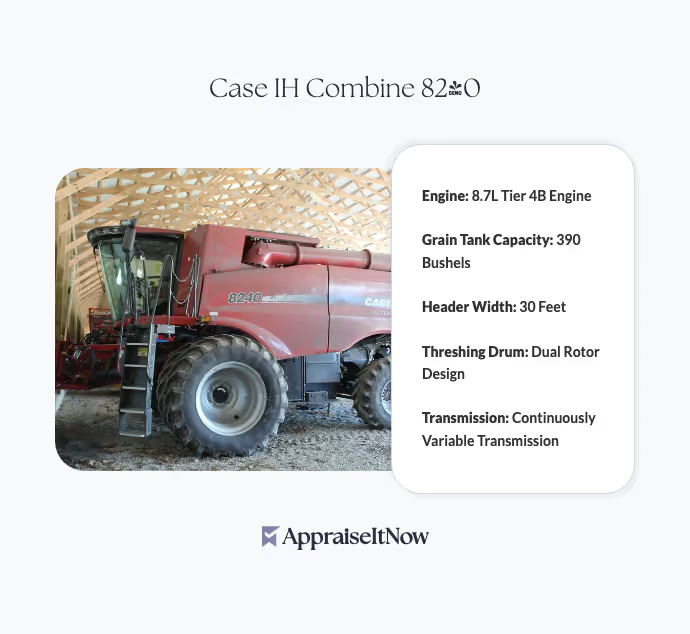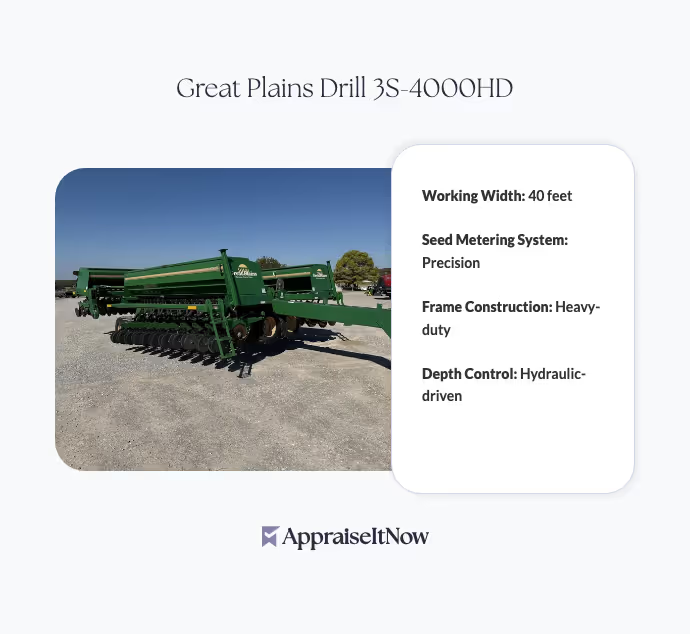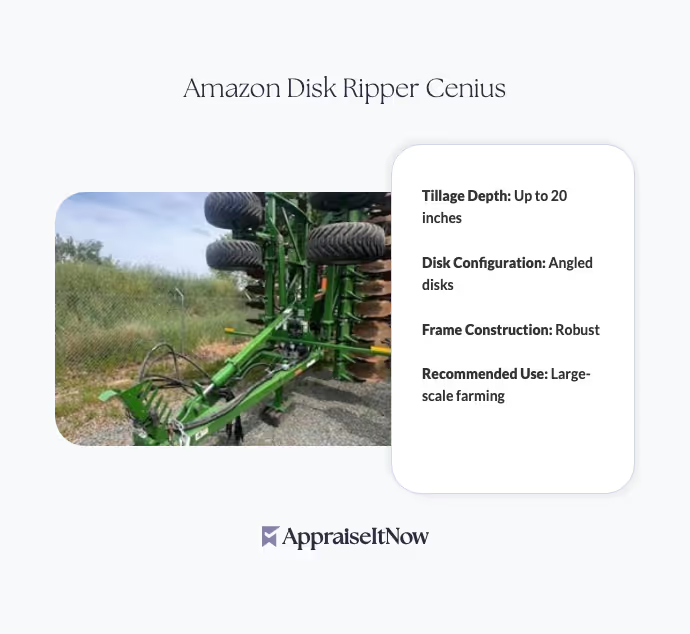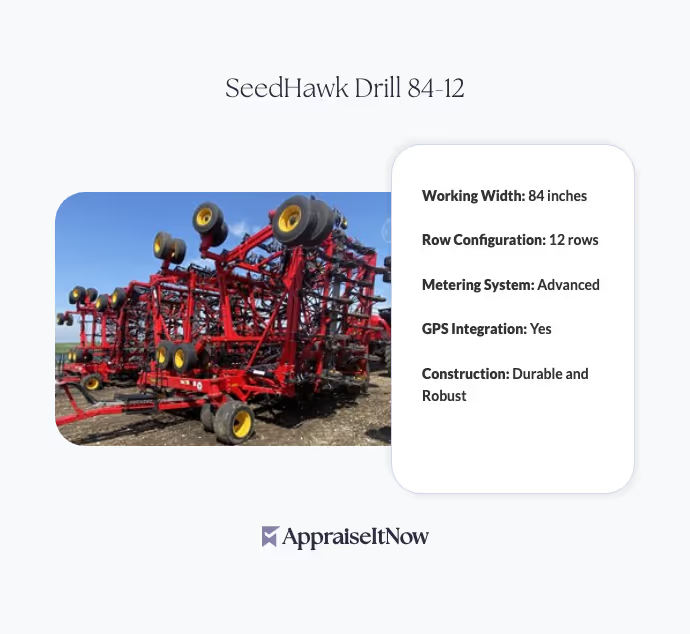<h1>How to Get Your Case IH Combine 8240 Appraised</h1>
<p>If you're planning to buy, sell, or insure a Case IH Combine 8240, understanding its true market value is essential. Whether you've inherited agricultural equipment, are liquidating a farming operation, or simply want to verify what your machinery is worth, a professional appraisal provides the documentation and confidence you need. The Case IH Combine 8240 typically values between <strong>$150,000 and $160,000</strong>, but this estimate depends heavily on specific conditions, age, and operational hours.</p>
<h2>Understanding Case IH Combine 8240 Market Value</h2>
<p>The Case IH Combine 8240 represents a significant investment in any farming operation. First introduced in 2015, this machine emerged during a period of substantial technological advancement in agricultural equipment, making its market positioning complex. The actual value of your specific 8240 depends on factors far beyond the base price range—condition, accumulated hours, maintenance history, and current market demand all play crucial roles.</p>
<p>When considering combine values, farmers often ask "how much does a Case combine cost?" expecting a single answer. The reality is more nuanced. A brand-new Case combine can exceed $500,000 depending on configuration and header options, while used models span a wide range. Your 8240's age and condition determine where it sits within the broader <strong><a href="/types/agricultural-equipment">agricultural equipment</a></strong> market spectrum.</p>
<div class="callout tip"><p><strong>Valuation Insight</strong></p>
<p>Equipment depreciates faster in the first five years of ownership, then stabilizes. Understanding your machine's age relative to current models helps position its value accurately in the resale market.</p></div>
<h2>Key Specifications That Affect Your 8240's Value</h2>
<p>The Case IH Combine 8240 brings impressive capabilities to the field, and each component influences appraisal results. The machine's <strong>8.7L Tier 4B engine</strong> delivers substantial power, while its <strong>dual-rotor threshing system</strong> and <strong>Continuously Variable Transmission</strong> represent cutting-edge technology for efficient grain harvesting. These features aren't just marketing points—they directly impact what buyers will pay and what insurance companies will accept as replacement cost.</p>
<p>One frequently asked question is "how much horsepower does a Case IH 8240 have?" The engine's specifications matter significantly because horsepower determines the machine's capacity for high-volume harvesting. The 8240's design for processing large grain volumes efficiently is backed by a <strong>390-bushel grain tank capacity</strong>—enough to handle extended harvesting periods without frequent unloading stops. This capacity represents concrete value to commercial operators managing time-sensitive harvest windows.</p>
<p>The <strong>30-foot header width</strong> demonstrates the machine's efficiency advantage. Wider headers mean fewer passes through the field, reducing fuel consumption and labor hours. When appraisers evaluate your Case IH Combine 8240, they consider how these specifications compare to competing models and newer iterations, since technological advancement directly affects market demand for older equipment.</p>
<div class="callout note"><p><strong>Equipment Consideration</strong></p>
<p>Machines with more advanced technology from their production year often maintain value better than earlier models from the same manufacturer, as operators seek precision farming advantages.</p></div>
<h2>The Impact of Operating Hours on Combine Value</h2>
<p>Operating hours represent the most critical factor in agricultural equipment valuation beyond initial price. A Case IH Combine 8240 with 500 operating hours tells a completely different story than one with 2,000 hours. Professional appraisers spend considerable time assessing hour meter readings and matching them to documented maintenance and service records.</p>
<p>How many bushels does an 8240 combine hold? The 390-bushel capacity is standard, but what matters for valuation is whether that capacity has been tested through actual use. Well-maintained equipment with moderate hours often commands stronger prices than newer machines with questionable maintenance histories. This is why documentation proving regular servicing significantly enhances appraised value—it suggests the equipment will continue performing reliably for future operators.</p>
<p>Consider the useful life expectancy when evaluating your machine. Most quality combines operate effectively for 8-12 years or 3,000-4,000 hours before requiring major component replacement. An 8240 purchased new in 2015 with reasonable hours for its age demonstrates healthier value retention than one pushed harder through back-to-back harvest seasons without adequate service breaks.</p>
<h2>Comparing Your 8240 to the 8250 Model</h2>
<p>Farmers shopping for combines frequently ask "how much does a Case 8250 combine cost?" or wonder about differences between models. The Case IH Combine 8250 represents a more recent upgrade with enhanced specifications and modern features. Understanding how your 8240 stacks up against newer competition directly affects its appraised value.</p>
<p>The upgrade path from 8240 to 8250 typically includes improved grain cleaning systems, updated technology packages, and efficiency gains. When appraisers evaluate your machine, they consider whether the extra investment in newer equipment justifies the cost difference to potential buyers. In many markets, the older 8240 still represents solid value for farmers managing budget constraints, which maintains reasonable demand and pricing.</p>
<p>How much does a Case 8250 combine weigh compared to an 8240, and does that matter? Equipment weight affects transportation costs and field operation. For appraisal purposes, your 8240's weight doesn't significantly impact value unless it limits operational capability in specific field conditions or creates unusual transportation expenses.</p>
<h2>Engine and Manufacturing Considerations</h2>
<p>Your 8240's <strong>8.7L Tier 4B engine</strong> was designed to meet environmental regulations while delivering dependable performance. One commonly asked question is "who makes engines for Case IH?" Case IH has produced its own engines and sourced from strategic partners like Cummins depending on equipment type and market requirements. Your 8240's engine specifications matter because compatible parts availability and service infrastructure affect long-term ownership costs.</p>
<p>Understanding where Case combines are built also influences value perception. Case combines manufactured in North America typically command confidence in parts availability and service support. Professional appraisers note the manufacturing location and vintage because this affects perceived reliability and resale desirability in different regions.</p>
<div class="callout tip"><p><strong>Technical Note</strong></p>
<p>Equipment manufactured during strong agricultural economy years often commands slightly different pricing than machines produced during downturns, as build quality and available options varied accordingly.</p></div>
<h2>Condition Assessment and Documentation</h2>
<p>When you request a professional appraisal, evaluators examine condition factors systematically. The Case IH Combine 8240's external appearance, mechanical function, and internal component condition all factor into final valuation. Paint condition, rust formation, wear on drive components, and hydraulic system integrity all receive careful assessment.</p>
<p>Documentation dramatically influences appraised value. Maintenance records proving regular service, oil analyses, component replacement receipts, and harvest season logs all support higher valuations. Machines with spotty documentation face significant value reduction because buyers cannot confidently assess true operating condition.</p>
<h2>Market Demand and Regional Factors</h2>
<p>Agricultural equipment values fluctuate based on regional farming patterns and commodity prices. During strong agricultural markets with high grain prices, farmers invest more readily in equipment, supporting higher valuations. Conversely, economic uncertainty depresses combine values across the board.</p>
<p>Your geographic location matters significantly. Equipment valued in the agricultural heartland of the Midwest often commands higher prices than identical machines in regions with less intensive grain production. Professional appraisers understand these regional variations and adjust valuations accordingly when you request market analysis.</p>
<h2>Moisture Condition and Storage Considerations</h2>
<p>How equipment has been stored directly impacts residual value. A Case IH Combine 8240 kept in climate-controlled storage with regular maintenance demonstrates better condition than one exposed to weather cycles and incomplete winterization. Corrosion, rust accumulation, and moisture damage all reduce market appeal and require costly restoration work.</p>
<p>If your combine has been properly maintained in storage, documented evidence supports claims of superior condition justifying premium pricing. If weather exposure has caused damage, honest documentation prevents valuation disputes and supports accurate insurance claims.</p>
<h2>Why Professional Appraisal Matters</h2>
<p>Attempting DIY valuation using online pricing guides often underestimates or overestimates equipment value. Professional appraisers bring expertise in understanding how <a href="/types/farm-equipment">farm equipment</a> markets work, what specific buyers seek in Case IH models, and how recent sales data suggests realistic pricing. When you need accurate valuation for legal, financial, or transactional purposes, certified appraisers provide documentation that stands up to professional scrutiny.</p>
<p>Whether you're navigating estate planning, business restructuring, equipment financing, or insurance claims, professional appraisals from credentialed experts create the documentation foundation you need. Services like AppraiseItNow connect you with specialists who understand agricultural equipment thoroughly and provide <strong>USPAP-compliant valuations</strong> accepted by financial institutions, insurers, and courts. Our network of <strong>AAA, ISA, ASA, and CAGA-credentialed appraisers</strong> brings deep expertise in evaluating combines and related <a href="/types/heavy-machinery">heavy machinery</a> across the U.S.</p>
<p>Learning more about the <a href="/blog/appraising-agricultural-equipment-assessing-machinery-and-equipment">appraisal process for agricultural equipment</a> helps you understand what to expect when working with professionals. Understanding preparation steps through resources on <a href="/blog/checklist-for-preparing-your-agricultural-equipment-for-appraisal">preparing your agricultural equipment for appraisal</a> ensures you maximize the accuracy and usefulness of your valuation.</p>
<div class="callout note"><p><strong>Key Takeaway</strong></p>
<p>Your Case IH Combine 8240 represents substantial value—typically $150,000 to $160,000—but accurate valuation requires professional assessment of condition, hours, maintenance records, and current market dynamics. A certified appraisal provides the documentation and confidence you need for buying, selling, insuring, or financial planning purposes.</p></div>
















